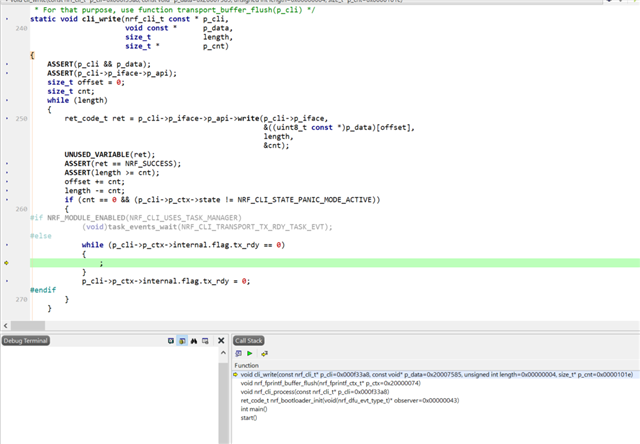Hi support,
Firstly, environment as below,
(1) upon SDK (nRF5_SDK_15.3.0_59ac345)
(2) Nordic Open_Bootloader (example project: Open_bootloader_usb_mbr_pca10056_debug)
(3) Nordic 52840 DK (PCA10056)
What I am doing is just try to migrate CLI over CDC/ACM to project open_bootloader_mbr, but stuck in cli_write and would not get out as below,
Can anyone tell me why please? Thanks a lot.

FYI, I have separate the configuration of CLI_CDC/ACM away from that of DFU_CDC/ACM as below,
(1) Setting of CLI_CDC/ACM
//==========================================================
// <h> nrf_cli_cdc_acm - CDC ACM command line interface transport
//==========================================================
// <q> NRF_CLI_CDC_ACM_ENABLED - Enable/disable the CLI CDC ACM module.
#ifndef NRF_CLI_CDC_ACM_ENABLED
#define NRF_CLI_CDC_ACM_ENABLED 1
#endif
// <o> NRF_CLI_CDC_ACM_COMM_INTERFACE - COMM interface number.
#ifndef NRF_CLI_CDC_ACM_COMM_INTERFACE
#define NRF_CLI_CDC_ACM_COMM_INTERFACE 0
#endif
// <s> NRF_CLI_CDC_ACM_COMM_EPIN - COMM IN endpoint number.
#ifndef NRF_CLI_CDC_ACM_COMM_EPIN
#define NRF_CLI_CDC_ACM_COMM_EPIN NRF_DRV_USBD_EPIN2
#endif
// <o> NRF_CLI_CDC_ACM_DATA_INTERFACE - DATA interface number.
#ifndef NRF_CLI_CDC_ACM_DATA_INTERFACE
#define NRF_CLI_CDC_ACM_DATA_INTERFACE 1
#endif
// <s> NRF_CLI_CDC_ACM_DATA_EPIN - DATA IN endpoint number.
#ifndef NRF_CLI_CDC_ACM_DATA_EPIN
#define NRF_CLI_CDC_ACM_DATA_EPIN NRF_DRV_USBD_EPIN1
#endif
// <s> NRF_CLI_CDC_ACM_DATA_EPOUT - DATA OUT endpoint number.
#ifndef NRF_CLI_CDC_ACM_DATA_EPOUT
#define NRF_CLI_CDC_ACM_DATA_EPOUT NRF_DRV_USBD_EPOUT1
#endif
(2) Setting of DFU_CDC/ACM
#define CDC_ACM_COMM_INTERFACE 2//0 #define CDC_ACM_COMM_EPIN NRF_DRV_USBD_EPIN4//NRF_DRV_USBD_EPIN2 #define CDC_ACM_DATA_INTERFACE 3//1 #define CDC_ACM_DATA_EPIN NRF_DRV_USBD_EPIN3//NRF_DRV_USBD_EPIN1 #define CDC_ACM_DATA_EPOUT NRF_DRV_USBD_EPOUT2//NRF_DRV_USBD_EPOUT1
Regards
J.S.


